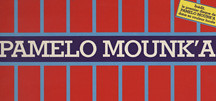
For the moment, this quartet of posts in tribute to Pamelo Mounk'a concludes with a brief look at some of his earliest solo work. "L'Argent Apelle L'Argent," drawn from his first sessions at Studio Adam in Paris, was a runaway success in 1981. Hoping to capitalize on this, the Safari Ambiance label rush-reissued an earlier album recorded in his native Zaire. This latter recording was probably made in the immediate wake of Pamelo leaving the employ of Tabu Ley Rochereau, PM having served a term as backing vocalist in Rochereau's band. This new/old disc was confusingly titled Pamelo Mounk'a, also the title of his then-current hit album. The reissue's cover bore a faux-sticker quote, Inedit, le premier disque de PAMELO MOUNK'A dans sa couleur locale, its copy uneasily residing on a urea-colored field against the retinal irritation of the sleeve's primary red and turquoise stripes (cf. Marcel Duchamp's 'Fluttering Hearts' seriagraph).
There can be no confusing the two collections, though. The sound of Safari Ambiance's reissue is loaded with distortion, intrinsic to the master tape itself, sufficiently so that I considered heading this post with a technical note. The band sounds faintly stiff by comparison with the supple ensemble playing of Congolese expatriates later supervised by Pamelo's French producer Eddy Gustave. (The songs recorded by Nigeria's King Sunny Ade during the late '70s also underwent a similar transformation under the auspices of a French producer in European studios, as will be examined in weeks to come.) The band's intonation is either impressionistic in the extreme or representative of a new strain of polytonality, depending on your disposition. Yet the stem cells of Pamelo's greatness are easily detected within these four tracks. The rabbit's foot of his songwriting, a woman's name ending in the letter 'a,' is much in evidence already, as is his signature honeyed vocal tone. The tunes build to the nagging insistence of the seben, that portion of a song where the band slams into overdrive, with the guitarists engaged in suggestive, wordless repartee and the horn players tossing call-and-response phrases around the studio. Also, the album is threaded with quantum kernels of verse (as when the singer, in a burst of anguish so great it could only be addressed in non sequitur English, exclaims "I am sorry dar-ling!") and melody that, with further refinement, would serve Pamelo Mounk'a well in the years ahead.
Though slightly abrasive to the ear, recordings of this stripe more and less represented the state-of-the-art during the '70s, a golden era for Congolese rumba-rock. Many of the best performances of that time, by legendary figures such as Franco & Orchestra OK Jazz or Rochereau, are not as well recorded as the four songs heard here. The key to the enduring worth of Pamelo Mounk'a might lie in the obvious joy evident from stem to stern within these grooves; all concerned sound as though playing these songs represents nothing less than the best possible time they'll have for a while to come. History would prove them right.
The genuinely classic tracks that made Pamelo's reputation will appear in future posts. For now, we party like it's 1979.
PAMELO MOUNK'A, LE PREMIER DISQUE DANS SA COULEUR LOCALE (@ 160)
Comments